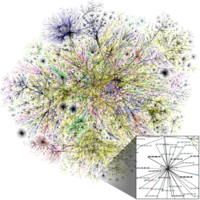
Photo from wikipedia
Introduction University students, as members of the digital generation, often access the internet for non-academic purposes while attending lectures in the classroom. Internet access for non-academic purposes during lectures is… Click to show full abstract
Introduction University students, as members of the digital generation, often access the internet for non-academic purposes while attending lectures in the classroom. Internet access for non-academic purposes during lectures is known as academic cyberslacking. This study aims to test the effects of media multitasking, self-efficacy, self-regulation, social media engagement, and Attention, Relevance, Confidence, and Satisfaction (ARCS) motivation, on the engagement in academic cyberslacking by university students. Methods The participants were 1485 university students, who had previously engaged in academic cyberslacking during lectures. The research instruments in this study were an academic cyberslacking scale, a media multitasking self-efficacy scale, a self-regulation scale, a social media engagement scale, and an ARCS motivation scale. The research model and hypotheses are tested using structural equation model (SEM) by Lisrel. Confirmatory factor analysis (CFA) is also used to analyze all the instruments. The respondents’ demographic data were analyzed using SPSS. Results The results showed that it is only media multitasking self-efficacy and social media engagement which have any significant effects regarding academic cyberslacking. Self-regulation and ARCS motivation do not have direct association with academic cyberslacking. Conclusion Students do academic cyberslacking during lectures. Media multitasking self-efficacy and social media engagement can predict students’ academic cyberslacking. It is recommended that students direct their involvement in the digital environment to more constructive efforts during lectures.
Journal Title: Psychology Research and Behavior Management
Year Published: 2022
Link to full text (if available)
Share on Social Media: Sign Up to like & get
recommendations!